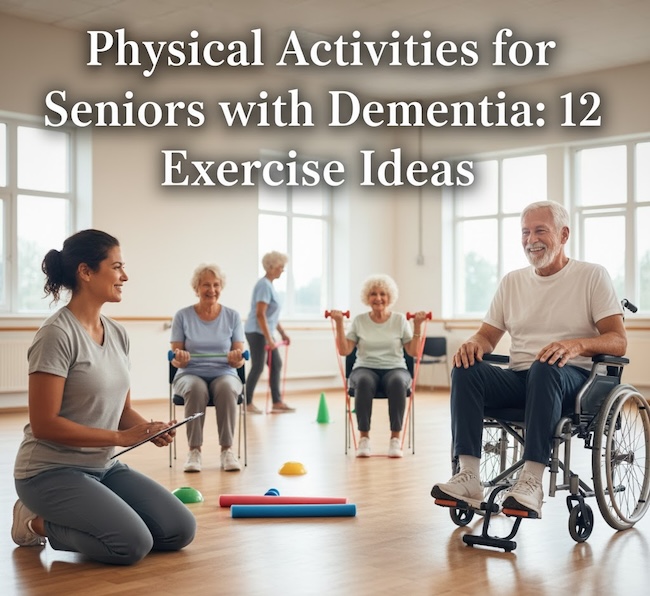In my years as a family caregiver, I've observed a powerful, often overlooked truth: movement is a form of communication for individuals living with dementia. When words become elusive and memories fade, the body still remembers the rhythm of music, the satisfaction of a stretch, or the simple joy of a breeze on a walk.
Physical activity is far more than an item to check off a wellness list; it is a direct pathway to reducing agitation, sparking moments of joy, and forging a non-verbal connection. The challenge, of course, lies in finding safe, engaging, and manageable activities.

Let's move beyond a simple exercise regimen and explore 12 ways to use movement as a tool for connection and well-being.
Physical activity has many benefits for seniors with dementia
Physical activities and exercise are excellent, non-drug ways to improve well-being and reduce challenging behaviors in seniors with Alzheimer's disease or dementia.
The important thing is to find activities that are enjoyable and safe for their ability level.
Staying active improves sleep, strength, flexibility, and circulation. It's also an effective way to reduce fall risk and can reduce pain.
Plus, it’s a great way to boost mood and self-esteem.
All these benefits help reduce and manage challenging behaviors such as agitation, sundowning, disrupted sleep, and more.
We explain how to encourage someone with dementia to stay active and share 12 great activity and exercise ideas for all ability levels.
We also describe how to determine the optimal level of activity, the benefits of exercise, and how to keep seniors safe while being active.
How to encourage activity in someone with dementia
Getting someone with dementia to be active or exercise may not always be easy, especially if it wasn’t part of their routine in the past.
It may help if you don’t refer to it as exercise, but treat it as just another regular task in their daily routine or as a fun special activity like a “dance party.”
It’s helpful to get your older adult moving because many people with dementia struggle to start activities on their own and to remember sequences.
Doing activities or exercise together allows you to demonstrate the movements, slow the pace as needed, and provide assistance when needed.
Being able to mimic your movements and not having to remember what to do makes it a more enjoyable activity for your older adult.
Leading them in exercise may seem like yet another thing to pack into your nonstop day, but it can help reduce challenging behaviors and improve sundowning symptoms – plus it helps you get active too.
12 ideas for physical activities for seniors with dementia
Gentle activities
- Walking – one of the best exercises around (and it’s free!). Walking around the house, the yard, or outside for any amount of time is wonderful for body and mind. You could even combine the walk by doing an errand together like walking the dog or going to the grocery store.
- The sit to stand exercise – strengthens muscles needed for essential activities like using the toilet
- Stay balanced in a standing position (hold on to a support when needed) – improves balance and posture, can be a standalone exercise or part of an everyday activity like washing dishes.
- Sit unsupported for a few minutes each day (with constant supervision to prevent falls) – strengthens the abdominal and back muscles needed for posture.
- Stretch while lying in bed – move various body parts and stretch stiff muscles. This can be done with assistance or independently.
Moderate activities
- Stretches and/or strength exercises – try this simple chair stretching routine or this easy strength and balance routine
- Tai chi – try these routines that can be adapted for a variety of physical conditions or this seated tai chi routine
- Gardening – something simple like raking or pulling weeds gives a sense of accomplishment and is a great workout
- Household chores – basic chores can be great exercise, like folding laundry, dusting, or light vacuuming
Advanced activities
- Dancing – this is a fun activity that doesn’t feel like exercise and can be done at their own pace. Play your older adult’s favorite dance music at home and lead them in a private dance party in the living room. Or, look for social events at senior centers that include dancing.
- Exercise class – some senior centers or similar organizations offer classes specifically for people with dementia.
- Water exercise – consider going with your older adult to a local class at the YMCA or senior center
How much exercise is recommended?
Each person’s health, personality, and cognitive abilities are different, so it will take some experimenting to find the amount and type of physical activity that works well for your older adult.
In general, aim for the amount that helps them feel good, both physically and mentally. And make sure to start slow and build up slowly.
Any amount of movement is excellent, no matter how small. Pushing too hard doesn’t help and could cause injuries.
For example, some people may enjoy a few 10-minute sessions throughout the day. Others might like to do 30 minutes all at once.
And some may need to start with only 2 minutes and slowly build up from there.
Benefits of physical activities for dementia
The benefits of exercise vary from person to person. But in general, being active improves health and well-being in many ways, including:
- Improving mood, reducing stress, and increasing calm to minimize episodes of aggression, wandering, or agitation
- Improving physical abilities for everyday tasks
- Reducing fall risk because of improved strength and balance
- Slowing mental decline
- Reducing depression
- Improving heart health
- Getting a sense of purpose and accomplishment while staying engaged and occupied
- Improving sleep and reducing sundowning symptoms
- Reducing constipation
Staying safe is the top priority
Exercise is helpful in many ways for seniors with dementia, but the top priority is ensuring they stay safe before, during, and after physical activities.
Safety tips:
- Before starting, check with the doctor to make sure that exercise is safe for their physical and cognitive conditions.
- Monitor exertion levels by checking in with brief conversations. If they can speak without being short of breath, the pace is comfortable. If they can’t hold a conversation because they’re breathing too hard, slow the pace.
- Keep them hydrated with plenty of water before, during, and after exercising.
- For outside activities, make sure they’re wearing a medical alert bracelet, personal identification, and/or a GPS tracker in case they get separated from you.
- If they get dizzy, weak, or experience pain, stop immediately and rest. Talk to their doctor to find out if future exercise will be safe.
Final Thoughts
As you consider these ideas, I encourage you to think like an activity detective, not a personal trainer. Your success won't be measured in reps or steps, but in the subtle cues of engagement: a relaxed posture, a glimmer of eye contact, or the soft hum along to a familiar song.
Be prepared to adapt, to abandon one idea for another, and to celebrate the smallest of victories. The ultimate goal is not a rigorous workout, but a shared experience that reminds your loved one that even now, there is space for vitality, for rhythm, and for joy.
Your patience and creativity in this endeavor are your most powerful tools.
Recommended for you:
- Home Dementia Exercise Program Increases Abilities and Improves Symptoms
- Head to Toe Gentle Seated Chair Exercises for Seniors Improve Range of Motion
- 10 Simple Fall Prevention Exercises Seniors Can Do at Home
About the Author

Connie is the founder of DailyCaring.com and was a hands-on caregiver for her grandmother for 20 years. (Grandma made it to 101 years old!) She knows how challenging, overwhelming, and all-consuming caring for an older adult can be. She also understands the importance of support, especially in the form of practical solutions, valuable resources, and self-care tips.














I am caring for my mother she is 89 years old, she has dementia it is advanced. She barely makes it to the bathroom (which is right across the hall from her room) then she walks to her recliner. That is the only exercise she gets and seems to be getting harder for her to do. She sits in her recliner and talks and talks to herself and when i ask her what she is talking about she tells me she is just making up stories, she constantly counts her fingers. If i ask her what year she was born she will tell me the correct year or if i ask her where she was born she will tell me the correct state and town. She has just lately started calling me ma and when i ask her how old she is she will say 10 or some really young age. Im just wondering if there is some kind of memory games or should i just keep asking her questions about her life. I’m feeling as though i should be doing more to help her memory, to help her stay in reality. any suggestions would be appreciated
Unfortunately with dementia, there isn’t a way to improve someone’s memory or stop the decline. Since her dementia is advanced, the kindest thing to do may be to focus on keeping her happy, calm, and feeling secure. Going along with her reality will help her feel validated and calm.
It’s important to accept that there’s nothing that will cure or stop the cognitive decline, but there are some exercises that have been found to be helpful – Home Dementia Exercise Program Increases Abilities and Improves Symptoms https://dailycaring.com/dementia-exercise-programs-increase-abilities-and-improve-symptoms/
But each person is different and if her dementia is advanced, these exercises might be too much for her current abilities.
These articles might also be helpful:
– 4 Ways Reminiscence Therapy for Dementia Brings Joy to Seniors https://dailycaring.com/4-ways-reminiscence-therapy-for-dementia-brings-joy-to-seniors/
– Q & A: Should You Correct Someone with Alzheimer’s? https://dailycaring.com/q-a-should-you-correct-someone-with-alzheimers/
– Therapeutic Fibbing: Why Experts Recommend Lying to Someone with Dementia https://dailycaring.com/why-experts-recommend-lying-to-someone-with-dementia/
– 3 Stages of Dementia: What to Expect as the Disease Progresses https://dailycaring.com/3-stages-of-dementia-what-to-expect/
– See our articles related to communication with someone with dementia at https://dailycaring.com/tag/alzheimers-dementia-communication/
Any suggeations for men w/ memory loss who “miss the toilet” when urinating?
Sometimes dementia can cause vision can change (more info here: https://dailycaring.com/dementia-and-eyesight-an-expert-explains-common-changes-and-behaviors-video/).
Perhaps adding a target inside the bowl that’s highly visible would help him see where he should be aiming. Something like these products might be helpful:
— BERRYZILLA HIT THE SPOT Decal https://amzn.to/2u7JLpU
— Toilet Sniper Self-Adhesive Targets https://amzn.to/2lUCWnU
— Mom Invented Tinkle Targets (flushable) https://amzn.to/2z9ZIRZ
It can be very frustrating communicating with someone who has dementia or is a bit deaf . You need to repeat things and what should take you one minute takes five to six minutes .
That’s very true. With people who have dementia, we already need to be extra patient to give them time to process what we’re saying and be able to respond. Adding hearing loss on top of that means that we need to allow even more extra time. The only solution is to train ourselves to be patient and give the person plenty of time. Rushing them is more likely to backfire and cause them to take even longer because they’re distressed or have become uncooperative.
Keeping your sentences short and simple may help them to process the information faster. We’ve got an article with suggestions here — https://dailycaring.com/how-to-talk-to-someone-with-alzheimers-use-short-direct-sentences/
We’ve got a few articles that may help improve the hearing loss situation:
— Affordable Hearing Aid Alternatives for Seniors: Hearing Amplifiers https://dailycaring.com/affordable-hearing-aid-alternatives-for-seniors-hearing-amplifiers/
— 10 Helpful Products for Hearing Impaired Seniors Increase Independence and Safety https://dailycaring.com/10-helpful-products-for-hearing-impaired-seniors-increase-independence-and-safety/
— How to Get the Best Hearing Aids from the Audiologist https://dailycaring.com/how-to-get-the-best-hearing-aids-from-the-audiologist/